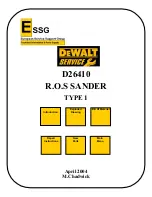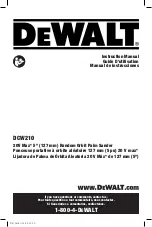
PDEXS 125 A1
■
8
│
GB
│
IE
│
NI
Switching on and off
NOTE
►
Always switch on the air sander before
bringing it into contact with the workpiece
material.
Switching on the air sander:
♦
Press the operator’s lever fully down
♦
Set the speed using the speed control .
Switching off the air sander:
♦
Release the operator’s lever .
♦
After you finish work, disconnect the device
from the compressed air source.
NOTE
►
First disconnect the hose from the compressed
air source (compressor) and only then discon-
nect the compressed air supply hose from the
device. This will ensure that the compressed
air supply hose does not wave around in an
uncontrolled manner.
Advice on use
■
Wait until the device has come to a standstill
before you put it down.
Sanding surfaces
■
Switch the air sander on and bring the whole
of its sanding area into contact with the surface
to be abraded. Move it using even pressure to
and fro over the workpiece.
NOTE
►
The sanding output and appearance are
largely dependent on the choice of sanding
sheet and the pressure applied. A sanding
sheet must be free of defects to produce a
good sanding output.
■
Ensure that you use an even pressure. Excessive
pressure does not produce a higher sanding
output, it just increases the wear on the sanding
sheet.
■
A sanding sheet previously used on metal must
not be used on other materials.
Replacing the backing plate
WARNING! RISK OF INJURY!
►
Always disconnect the device from the com-
pressed air source before you replace the
backing plate .
♦
Push the open-ended spanner between the
backing plate and collar .
♦
Release the backing plate by turning the pla-
te anticlockwise and holding the open-ended
spanner still against this movement.
♦
Screw on a new backing plate clockwise
until tight while holding the open-ended spanner
still against this movement.
Maintenance and cleaning
WARNING! RISK OF INJURY!
Disconnect the appliance from the
compressed air supply.
CAUTION!
►
Before maintenance, clean off any hazardous
substances that may (due to working pro-
cesses) have accumulated on the appliance.
Avoid all skin contact with these substances.
If the skin comes into contact with hazardous
dusts, this can lead to severe dermatitis. If
dust is produced or swirled up during mainte-
nance, it can be inhaled.
NOTE
To ensure correct functioning and long-term
durability of the sander, pay attention to the
following points:
■
Sufficient and continuously intact oil lubrication
is highly important for optimum functioning.
■
Check the speed and vibration levels after each
use.
■
Check the idle speed regularly and after any
maintenance is performed:
use a rev counter and perform the measurement
without any clamped tools. The idle speed may
not be exceeded under any circumstances at a
residual pressure of 6.3 bar.
Summary of Contents for 304779
Page 3: ...A B ...
Page 15: ...PDEXS 125 A1 12 GB IE NI ...












































